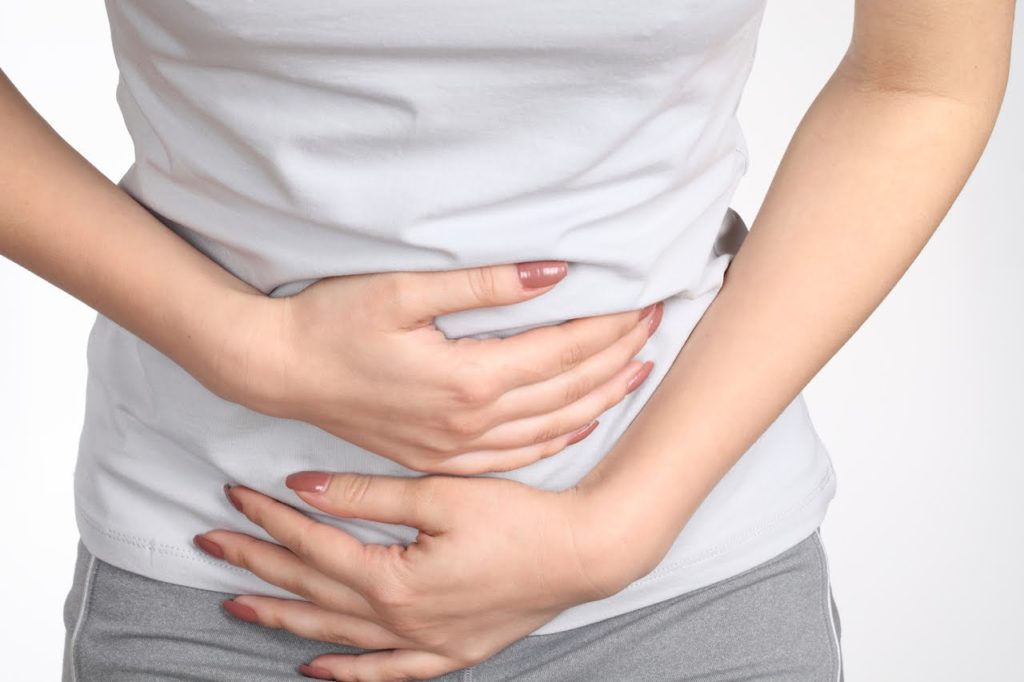How To Overcome Bloating
February 17 2018A bloated stomach can seriously impact on your life, but here are some simple ways to ease your tummy troubles.

For many women, an aching, swollen stomach is a fact of life. “Two-thirds of women will experience bloating periodically,” says gastroenterologist Professor Terry Bolin, president of The Gut Foundation. “But one in five will experience bloating so severely that it impacts on their work and their lives.”
Whether it results in a visibly swollen stomach or just causes pain or discomfort, bloating is caused by the gases produced when we eat or drink. Gas is produced in the colon and ideally moves through the body before being emitted or absorbed. However, for some, the gas doesn’t have a smooth progression through the body, which is where issues arise. Professor Bolin says that bloating is a real problem and that for most women, bloating will occur in the small intestine rather than the colon. This often results in the “six-months-pregnant look” with distention above the waist and high in the stomach.
“Carbon gas usually travels through the small intestine, but if it gets trapped, that produces discomfort,” Professor Bolin says. If there’s no medical reason behind the bloating, relief is available, says Professor Bolin. Whether it’s through dietary changes, the use of over-the-counter medications such as Buscopan or Colofac, or by consuming probiotics to help with digestion, bloating can be managed.
Accredited practising dietitian Trent Watson says that bloating is one of the most common symptoms that bring patients to his practice. “I see people with this problem every day. For some people, it could be as simple as eating too much. You should only eat when you’re hungry and leave the table when you’re satisfied – not when you’re full. You should aim to feel about 80 percent full so that 20 to 30 minutes later you won’t feel bloated.”
Don’t self-diagnose
If bloating is seriously affecting your life, you might want to have the causes investigated. It might be caused by irritable bowel syndrome or pathological causes such as coeliac disease could be behind it, says Dr Watson. “There are a number of reasons why people experience bloating, but if you’re consistently suffering from abdominal bloating, don’t attempt to self-diagnose and cut out certain foods. Instead, seek advice from an accredited practising dietitian who specialises in allergies and intolerances to uncover the cause.”
As our dietary habits change, and more processed foods are consumed, researchers are pointing to another cause of bloating: fructose intolerance. According to researchers at the University of Iowa, people with dietary fructose intolerance are rarely diagnosed, and yet they estimate that this condition is on the rise as more and more fructose is being found in our diets.
Satish Rao, a professor of internal medicine at the University of Iowa, says part of the problem is high-fructose syrups are being added to a wide range of foods and our bodies can’t digest them. In order to be absorbed, fructose requires the presence of glucose, but in most foods the balance is rarely equal, leading to problems with digestion.
10 ways to settle your stomach
When there is no one medical cause behind the bloating, some simple tips can relieve the problem or even stop it occurring in the first place. Here’s what our experts suggest can offer relief.
- Maintain a regular diet with moderate amounts of healthy foods. “A consistent pattern of eating can reduce people’s experiences of bloating,” says Dr Watson.
- Try yoga. Certain poses, such as the cobra or hero, can help with digestion and improve bloating.
- Cut out or at least cut back on your alcohol intake. “Alcohol is a real gut irritant,” says Dr Watson. And don’t replace your champagne with fizzy water; bubbles cause troubles, so stick to still water.
- Switch your fibres. “Fibre is important,” says Professor Bolin. “However, it’s a matter of finding a balance between eating enough fibre to avoid constipation and limit bloating. Try rye or spelt bread rather than white bread and avoid gas-producing foods such as beans.”
- Stress less. Take time to chill out and sort out what’s causing you stress – it can disrupt the muscular contractions that move gas through your stomach.
- Forgo fat and caffeine. “Fat and caffeine are the two biggest triggers for bloating,” explains Professor Bolin. “So if you’re experiencing bloating regularly you should modify your diet.”
- Try a herbal remedy for bloating such as Iberogast. “This is a mixture of nine different herbs that has been scientifically trialled,” says Professor Bolin.
- Go for a walk or a run. Even though you’ll feel like lying on the couch, simple exercise can help move the gases through your system and ease the pain.
- Limit the sugar in your diet, especially from fruits and fruit juices. They form more gas when they ferment and cause bloating.
- Use a ball. Rubbing a ball over your abdomen can help the gas move through the small intestine, says Professor Bolin. “Use any soft ball, such as a squash ball, and roll it around your stomach to help the gases move.”
Sourced from My Body+Soul.
